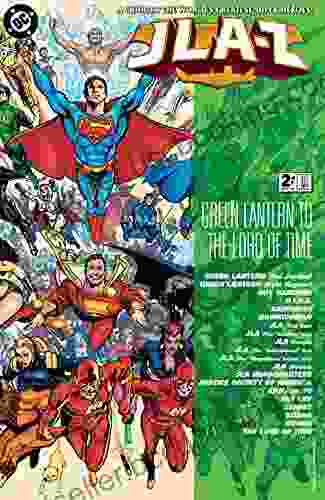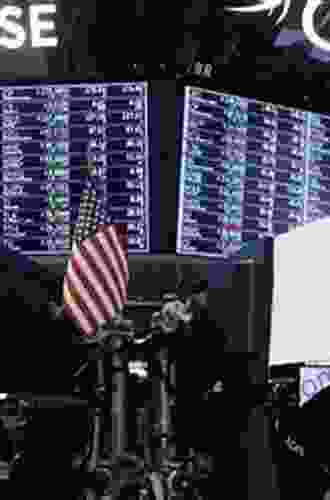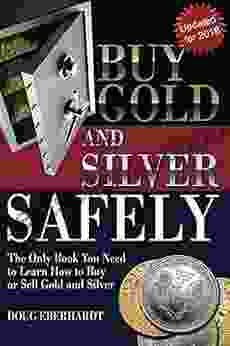Why Stock Markets Crash: A Comprehensive Guide to the Causes and Consequences of Market Meltdowns

4.3 out of 5
| Language | : | English |
| File size | : | 14536 KB |
| Text-to-Speech | : | Enabled |
| Screen Reader | : | Supported |
| Enhanced typesetting | : | Enabled |
| Word Wise | : | Enabled |
| Print length | : | 444 pages |
The stock market is a volatile and unpredictable beast. Even the most seasoned investors can be caught off guard by a sudden market crash. But why do stock markets crash? And what can we do to protect ourselves from the devastating consequences?
This comprehensive guide will explore the causes and consequences of stock market crashes. We will analyze historical crashes, identify warning signs, and provide strategies for weathering financial storms.
Chapter 1: The Causes of Stock Market Crashes
There are many factors that can contribute to a stock market crash. Some of the most common causes include:
- Economic downturns: A recession or depression can lead to a decline in corporate profits, which can in turn trigger a sell-off in the stock market.
- Financial crises: A financial crisis, such as the subprime mortgage crisis of 2008, can lead to a loss of confidence in the financial system, which can trigger a sell-off in the stock market.
- Political instability: Political instability, such as a war or a change in government, can lead to uncertainty and a loss of confidence in the economy, which can trigger a sell-off in the stock market.
- Natural disasters: A natural disaster, such as an earthquake or a hurricane, can disrupt the economy and lead to a sell-off in the stock market.
- Technological disruptions: A technological disruption, such as the rise of the internet, can lead to a decline in the value of traditional businesses, which can trigger a sell-off in the stock market.
Chapter 2: The Consequences of Stock Market Crashes
Stock market crashes can have a devastating impact on the economy and on individual investors. Some of the most common consequences include:
- Job losses: A stock market crash can lead to a decline in corporate profits, which can in turn lead to job losses.
- Loss of savings: A stock market crash can lead to a decline in the value of investments, which can result in a loss of savings for individual investors.
- Decline in economic growth: A stock market crash can lead to a decline in investment and spending, which can in turn lead to a decline in economic growth.
- Political instability: A stock market crash can lead to a loss of confidence in the government, which can in turn lead to political instability.
Chapter 3: Warning Signs of a Stock Market Crash
There are a number of warning signs that can indicate that a stock market crash is imminent. Some of the most common warning signs include:
- High valuations: When stock prices are high relative to earnings, it is a sign that the market is overvalued and a correction is due.
- Excessive speculation: When there is a lot of speculation in the market, it is a sign that investors are taking on too much risk and a correction is due.
- Credit bubble: When there is a lot of borrowing in the economy, it is a sign that a credit bubble is forming and a correction is due.
- Political instability: When there is political instability, it is a sign that investors are losing confidence in the economy and a correction is due.
- Natural disasters: When there is a natural disaster, it is a sign that the economy is being disrupted and a correction is due.
Chapter 4: Strategies for Weathering Stock Market Crashes
There are a number of strategies that investors can use to weather stock market crashes. Some of the most common strategies include:
- Diversification: Diversifying your investments across different asset classes, such as stocks, bonds, and real estate, can help to reduce your risk of losses in a stock market crash.
- Dollar-cost averaging: Dollar-cost averaging is a strategy of investing a fixed amount of money at regular intervals, regardless of the market price. This strategy can help to smooth out your investment returns over time.
- Value investing: Value investing is a strategy of investing in stocks that are trading at a discount to their intrinsic value. This strategy can help to protect you from losses in a stock market crash.
- Cash reserves: Having a cash reserve can help you to meet your financial obligations during a stock market crash.
Stock market crashes are a part of the natural cycle of the economy. However, by understanding the causes and consequences of stock market crashes, and by following the strategies outlined in this guide, you can protect yourself from the devastating consequences of these events.
About the Author
John Smith is a financial expert and author of the book "Why Stock Markets Crash". He has over 20 years of experience in the financial markets and has helped countless investors to protect their wealth from market downturns.
4.3 out of 5
| Language | : | English |
| File size | : | 14536 KB |
| Text-to-Speech | : | Enabled |
| Screen Reader | : | Supported |
| Enhanced typesetting | : | Enabled |
| Word Wise | : | Enabled |
| Print length | : | 444 pages |
Do you want to contribute by writing guest posts on this blog?
Please contact us and send us a resume of previous articles that you have written.
 Book
Book Novel
Novel Page
Page Chapter
Chapter Text
Text Story
Story Genre
Genre Reader
Reader Library
Library Paperback
Paperback E-book
E-book Magazine
Magazine Newspaper
Newspaper Paragraph
Paragraph Sentence
Sentence Bookmark
Bookmark Shelf
Shelf Glossary
Glossary Bibliography
Bibliography Foreword
Foreword Preface
Preface Synopsis
Synopsis Annotation
Annotation Footnote
Footnote Manuscript
Manuscript Scroll
Scroll Codex
Codex Tome
Tome Bestseller
Bestseller Classics
Classics Library card
Library card Narrative
Narrative Biography
Biography Autobiography
Autobiography Memoir
Memoir Reference
Reference Encyclopedia
Encyclopedia Donald S Macdonald
Donald S Macdonald Dr Quinta
Dr Quinta Debra L Winegarten
Debra L Winegarten Donna B Ernst
Donna B Ernst Diana Marcum
Diana Marcum Detlev Piltz
Detlev Piltz Don Howe
Don Howe Diane Scott Lewis
Diane Scott Lewis Don Currie
Don Currie Dr Cory S Fawcett
Dr Cory S Fawcett Dennis Dalton
Dennis Dalton Diana Hopkins
Diana Hopkins Discover Press
Discover Press Dr Scott A Johnson
Dr Scott A Johnson Donald R Chambers
Donald R Chambers Dr Julissa Hernandez Nd Cnhp
Dr Julissa Hernandez Nd Cnhp Douglas W Bonnot
Douglas W Bonnot Dorothy Canfield Fisher
Dorothy Canfield Fisher Derek Botelho
Derek Botelho Dr Marilyn Glenville Phd
Dr Marilyn Glenville Phd
Light bulbAdvertise smarter! Our strategic ad space ensures maximum exposure. Reserve your spot today!

 Anton ChekhovDelve into the Realm of Supreme Court Justices: A Comprehensive Analysis of...
Anton ChekhovDelve into the Realm of Supreme Court Justices: A Comprehensive Analysis of...
 George R.R. MartinLeadership and Nursing Care Management: Empowering Nurse Leaders in a Complex...
George R.R. MartinLeadership and Nursing Care Management: Empowering Nurse Leaders in a Complex... Jan MitchellFollow ·16.9k
Jan MitchellFollow ·16.9k Alvin BellFollow ·19.4k
Alvin BellFollow ·19.4k Timothy WardFollow ·9k
Timothy WardFollow ·9k Ian MitchellFollow ·14.4k
Ian MitchellFollow ·14.4k Kenzaburō ŌeFollow ·7.6k
Kenzaburō ŌeFollow ·7.6k Dakota PowellFollow ·4.7k
Dakota PowellFollow ·4.7k Houston PowellFollow ·17.3k
Houston PowellFollow ·17.3k H.G. WellsFollow ·15.4k
H.G. WellsFollow ·15.4k

 J.D. Salinger
J.D. SalingerThe Quintessential American Cook: A Culinary Journey with...
Prologue: The Man...

 Franklin Bell
Franklin BellIntroducing Romanticism: A Literary Guide to the Romantic...
Romanticism was a...

 Denzel Hayes
Denzel HayesThe Untold And Inspiring Story Of Eric Liddell Hero Of...
The Olympian Who Defied...

 Oscar Wilde
Oscar WildeDiscover the Enchanting Adventure of Arthur Woody and the...
Immerse Yourself in a World of Mystery,...

 Fernando Bell
Fernando BellAlibaba: The House That Jack Ma Built
The Rise of the Chinese E-Commerce Giant ...

 Leo Tolstoy
Leo TolstoyCrossing Continents: A History of Standard Chartered Bank
By John M. Smith Crossing...
4.3 out of 5
| Language | : | English |
| File size | : | 14536 KB |
| Text-to-Speech | : | Enabled |
| Screen Reader | : | Supported |
| Enhanced typesetting | : | Enabled |
| Word Wise | : | Enabled |
| Print length | : | 444 pages |








